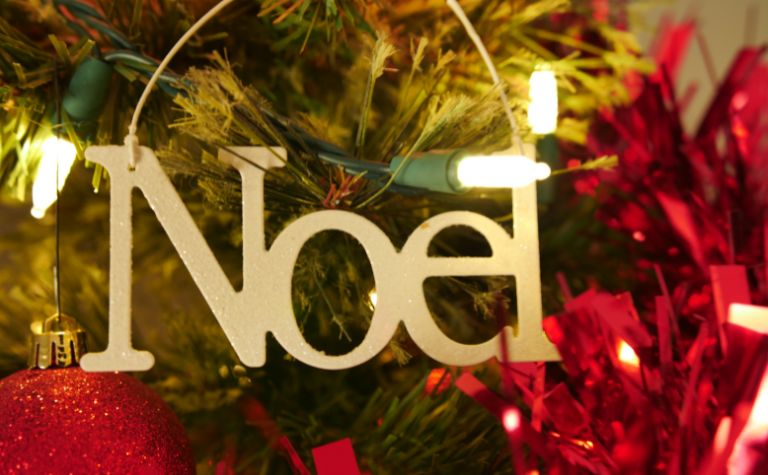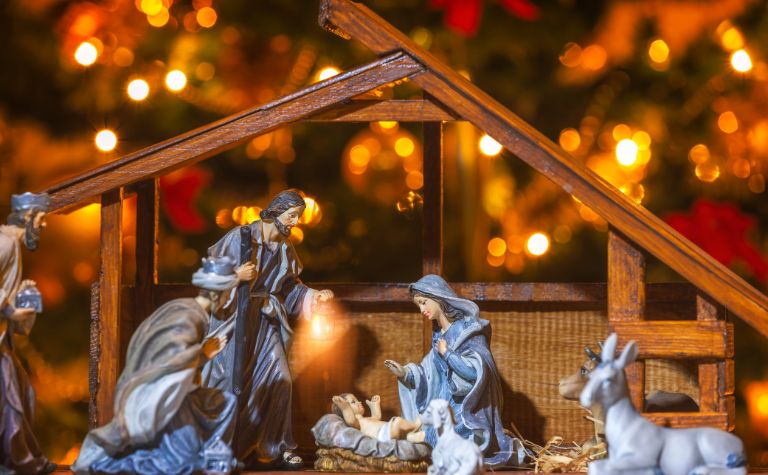The word “Noel” is a term that many of us associate with the Christmas season.
Whether we hear it in carols, see it on holiday cards, or encounter it in various festive decorations, Noel is undeniably a part of the holiday lexicon.
But have you ever stopped to wonder what “Noel” means, especially in the Hebrew language and tradition?
In this article, we’ll explore the fascinating origins and meanings of “Noel,” with a special focus on its Hebrew connections.

The Hebrew Roots of Noel
While the term “Noel” is most commonly linked to Latin and Old French origins (see below), it also has an interesting connection to the Hebrew language and biblical tradition.
The Hebrew term often associated with “Noel” is “Nolad,” which translates to “was born” or “to be born.”
Meaning in Hebrew
In Hebrew, the term “Nolad” carries significant weight, especially in the context of biblical texts.
It is used to describe the act of birth and the beginning of life, themes that are deeply ingrained in religious and cultural narratives.
In this sense, the Hebrew term resonates with the original Latin meaning of “Noel,” both focusing on the concept of birth.
Biblical Origins
The Hebrew connection becomes particularly intriguing when we consider the Christmas story rooted in the Bible.
The birth of Jesus Christ, celebrated as the central event of Christmas, is described in terms that align closely with the Hebrew concept of “Nolad.”
This adds another layer of depth to our understanding of “Noel,” linking it not just to Christian tradition but also to older Hebrew texts.
A Bridge Between Traditions
The Hebrew connection bridges Christian and Jewish traditions, highlighting the shared themes of birth and renewal that are central to both.
While “Noel” is primarily used in the context of Christmas celebrations, its Hebrew counterpart, “Nolad” broadens its scope, making it relevant to a wider audience that includes people of different faiths and cultural backgrounds.
The term “Noel” gains additional richness and complexity when viewed through the lens of Hebrew language and tradition.
Its association with the Hebrew term “Nolad” reinforces its original meaning and connects it to a broader religious and cultural narrative.
This makes “Noel” a term that transcends its Christmas-centric usage, linking it to universal themes of birth, life, and celebration.

The Origin of the Word “Noel”
The term “Noel” has a rich history that takes us back to ancient languages and traditions.
While it’s a word that many associate with Christmas, its origins are more complex than a simple holiday greeting.
Latin and Old French Roots
The word “Noel” is derived from the Latin word “Natalis,” which means “birth.”
It made its way into Old French as “Noël,” carrying the same meaning.
In this context, the term refers to the birth of Jesus Christ, the central event celebrated during the Christmas season.
Usage in Christmas Carols and Greetings
The term gained widespread popularity through its inclusion in Christmas carols, most notably in songs like “The First Noel,” which signify the joy and celebration surrounding the birth of Christ.
Over time, “Noel” has also become a common word used in Christmas cards and holiday greetings, often as a synonym for Christmas itself.
Evolution Over Time
As the word traveled through different cultures and languages, its usage evolved.
While it retains its original meaning related to birth and celebration, it has also taken on broader connotations of joy, festivity, and the holiday season in general.

Noel’s Significance in the Christian Tradition
The term “Noel” holds a special place in Christian tradition, where it is deeply intertwined with the celebration of Christmas and the birth of Jesus Christ.
But what exactly makes this term so significant in Christian contexts, and how does its Hebrew connection add to its importance?
Central to the Christmas Story
At its core, “Noel” is a term that encapsulates the essence of the Christmas story—the birth of Jesus Christ in Bethlehem.
This event is considered the fulfillment of prophecies and the beginning of a new era in Christian belief.
The term “Noel,” derived from the Latin word for “birth,” serves as a shorthand for this monumental event.
Liturgical Usage
In Christian liturgy, the term “Noel” often appears in hymns, prayers, and sermons during the Advent and Christmas seasons.
It serves as a focal point for the spiritual preparation leading up to Christmas and the celebrations that follow.
The word is used to evoke a sense of joy, hope, and divine love, all of which are central themes in Christian theology.
Connection to Hebrew Scriptures
The Hebrew connection adds another layer of significance to the term “Noel” in Christian tradition.
The birth of Jesus is seen as the fulfillment of Old Testament prophecies, many of which are written in Hebrew.
The Hebrew term “Nolad,” meaning “to be born,” resonates with the Christian understanding of Jesus’ birth as a divine event.
This connection enriches the Christian interpretation of “Noel,” linking it to a broader biblical context.
A Symbol of Unity and Celebration
Beyond its liturgical and theological implications, “Noel” symbolizes unity and celebration during the Christmas season.
It brings together communities, families, and individuals in a shared experience of joy and gratitude.
Whether sung in carols or written in Christmas cards, “Noel” encapsulates the spirit of love and goodwill that defines the holiday season for many Christians.
In summary, the term “Noel” holds profound significance in Christian tradition, representing the birth of Jesus Christ and the joyous celebrations accompanying this event.
Its connection to Hebrew scriptures adds depth to its meaning, making it a multi-faceted term that resonates with people across different faiths and cultural backgrounds.
Noel in Modern Culture
The term “Noel” has transcended its religious origins to become a staple in modern culture, especially during the holiday season.
But how exactly is this ancient term used today, and what does it signify in a contemporary context?
Ubiquitous in Holiday Celebrations
Today, “Noel” is everywhere during the Christmas season. You’ll find it on holiday cards, Christmas decorations, and even on social media posts.
It’s used in a variety of ways, from a simple greeting to a more elaborate expression of holiday sentiments.
The term has become so ingrained in modern culture that it’s often used without much thought to its original meaning.
Popular in Music and Entertainment
One of the most notable appearances of “Noel” is in Christmas carols and songs.
Classics like “The First Noel” continue to be popular, and new renditions often make their way into holiday playlists.
The term has also found its way into movies, TV specials, and other forms of entertainment that aim to capture the spirit of the season.
Commercial Usage
In the commercial sphere, “Noel” is frequently used in advertising and marketing campaigns to evoke a sense of holiday cheer.
Whether it’s a “Noel Sale” at a retail store or a special “Noel Edition” product, the term is leveraged to attract consumers and promote seasonal offerings.
Loss of Original Meaning?
While the term has gained widespread popularity, there’s a question of whether its original meaning—rooted in the concept of birth and its Hebrew and Christian significances—has been diluted.
For many, “Noel” has become synonymous with Christmas and the holiday season, but the deeper religious and cultural nuances may be lost on the general public.
A Universal Symbol
Despite the potential loss of its original meaning, “Noel” has become a universal symbol of the holiday season, embraced by people of various faiths and cultural backgrounds.
Its widespread usage reflects its ability to unite people in a common celebration, even if the reasons for that celebration differ.
Related Questions
Joseph, the husband of Mary and the earthly father of Jesus Christ, is depicted in the Gospels as humble, law-abiding, and obedient. In many Christmas scenes, such as in displays of the manger, he is...
The virgin Mary, the mother of Jesus, is one of the most fascinating people in the Bible. For 2,000 years, people of different eras and cultures have marveled at her faith in God. Mary's story in the...
